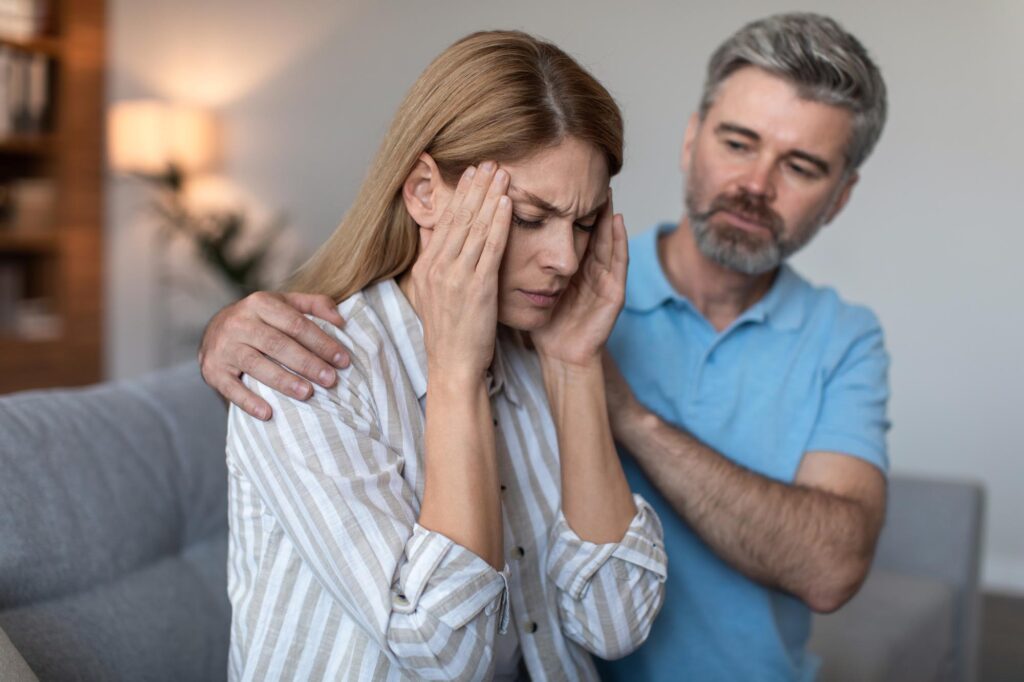Relationships are complex journeys filled with both joyful moments and challenging obstacles. When couples face difficulties, professional support through couples therapy can be a transformative path toward healing and growth.
Couples therapy is a specialized form of psychotherapy where both partners work with a trained mental health professional to:
- Identify relationship patterns
- Resolve conflicts constructively
- Strengthen emotional bonds
- Improve communication skills
- Build a healthier partnership
The decision to seek couples therapy reflects strength and commitment to nurturing your relationship. Whether you’re dealing with trust issues, communication breakdowns, or life transitions, couples therapy provides a safe space to explore these challenges together.
This article explores five powerful benefits of couples therapy and answers the crucial question: “Does couples therapy actually work?” We’ll dive into research-backed evidence and practical insights to help you understand how therapeutic support can enhance your relationship’s foundation and create lasting positive change.
What is Couples Therapy?
Couples therapy, also known as couples counseling or marital therapy, is a specialized form of psychotherapy designed to help partners navigate their relationship challenges. A licensed mental health professional works with both partners to identify patterns, heal wounds, and build stronger connections.
What Happens During Couples Therapy?
During therapy sessions, couples engage in:
- Structured conversations about their relationship dynamics
- Guided exercises to practice new communication skills
- Joint problem-solving activities to address specific issues
- Individual reflection on personal contributions to relationship patterns
What Are the Goals of Couples Counseling?
The goals of couples counseling typically center around:
- Building healthier communication patterns
- Restoring trust and emotional intimacy
- Developing conflict resolution skills
- Creating shared relationship vision
- Healing from past hurts or betrayals
What Issues Can Couples Therapy Help With?
Common relationship conflicts that bring couples to therapy include:
- Trust Issues: Infidelity, emotional affairs, or broken promises
- Communication Breakdown: Frequent arguments, misunderstandings, or silence
- Life Transitions: Career changes, parenthood, or relocation stress
- Financial Disagreements: Different spending habits or financial goals
- Intimacy Challenges: Physical or emotional distance between partners
A skilled couples therapist creates a safe, neutral space where both partners can express their needs, fears, and hopes while working toward positive change in their relationship.
What are the Benefits of Couples Therapy?

Couples therapy offers transformative benefits that can revitalize relationships and create lasting positive change. Research shows that couples who engage in therapy experience significant improvements in relationship satisfaction and individual well-being.
Let’s explore the powerful advantages of couples therapy:
Enhanced Communication
Communication lies at the heart of every successful relationship. Many couples struggle with expressing their needs, feelings, and concerns effectively. Couples therapy provides a structured environment where partners learn to:
- Practice active listening – Understanding the difference between hearing and truly listening to your partner
- Express emotions clearly – Moving beyond surface-level conversations to share deeper feelings
- Identify communication patterns – Recognizing destructive cycles and replacing them with healthy dialogue
- Navigate difficult conversations – Learning to discuss sensitive topics without escalating conflict
A skilled therapist helps couples develop practical communication tools such as:
- The “speaker-listener” technique
- “I” statements instead of blame language
- Non-verbal communication awareness
- Emotional validation methods
These communication skills create a foundation for:
- Deeper emotional intimacy
- Better conflict resolution
- Increased mutual understanding
- Stronger relationship bonds
Couples therapy teaches partners to recognize communication barriers that may be damaging their relationship. Common obstacles include:
- Defensive responses
- Criticism and contempt
- Stonewalling or withdrawal
- Assumptions and mind-reading
Through guided practice and feedback, couples learn to replace these patterns with healthy communication strategies. The therapist creates a safe space for partners to:
- Share vulnerable feelings
- Practice new communication skills
- Receive constructive feedback
- Build confidence in expressing needs
These enhanced communication abilities extend beyond therapy sessions, empowering couples to maintain stronger connections in their daily lives. Partners develop the capacity to discuss challenging topics with empathy and understanding, leading to more satisfying and resilient relationships.
Deepened Connection and Intimacy
Couples therapy creates a safe space where partners can rediscover their emotional bond and rebuild intimate connections. Through guided therapeutic exercises, couples learn to:
- Share vulnerable feelings safely
- Express appreciation and gratitude
- Rebuild physical and emotional intimacy
- Create meaningful rituals of connection
A skilled therapist helps couples identify attachment patterns that may block intimacy. By understanding these patterns, partners can break free from defensive behaviors and create new ways of connecting.
The therapeutic process encourages:
- Deep emotional presence – Learning to truly be there for each other
- Physical reconnection – Rebuilding comfort with touch and intimacy
- Trust restoration – Healing past hurts that created emotional distance
- Quality time – Creating dedicated spaces for nurturing the relationship
Many couples discover that therapy provides tools to maintain lasting intimacy:
- Mindfulness exercises that enhance emotional awareness
- Communication techniques that foster vulnerability
- Activities that rebuild physical affection
- Strategies to maintain connection during conflicts
Regular therapy sessions help couples stay accountable to practicing these connection-building skills. As trust grows stronger, partners often report feeling more secure, understood, and deeply bonded with each other.
Conflict Resolution
Couples therapy provides partners with practical tools to handle disagreements in a positive way. A trained therapist helps couples use effective methods for resolving conflicts:
- Time-Out Protocol: Learning when to take a break from intense discussions and how to continue them in a productive manner
- Active Listening Skills: Developing the ability to genuinely understand your partner’s point of view without preparing responses
- “I” Statement Framework: Expressing needs and emotions without blaming or criticizing
- Problem-Solving Steps: Breaking down complicated problems into manageable and actionable solutions
In therapy, couples learn how to:
- Replace criticism with specific requests
- Transform defensive reactions into curious questions
- Move from gridlock to dialogue on recurring issues
- Create win-win solutions that honor both partners’ needs
The skills learned in couples therapy go beyond the therapy sessions, strengthening relationships through everyday interactions. Partners gain confidence in facing future challenges together, turning potential arguments into opportunities for growth and understanding.
These conflict resolution tools help couples build a strong foundation for their relationship that can withstand difficult times. By learning how to handle disagreements effectively, partners create a more resilient bond that becomes stronger through challenges instead of being weakened by them.
Emotional Support
One of the main reasons why couples therapy is effective is because it provides a supportive environment where both partners can express themselves freely. In these sessions, licensed therapists create a safe space for couples to:
- Share their deepest feelings without worrying about being judged
- Talk about important issues that may be hard to discuss alone
- Understand and work through complicated emotions with professional help
- Feel validated and understood by their partner
The therapy room becomes a place where partners can openly talk about sensitive subjects that they might not feel comfortable discussing at home. With the help of a therapist, couples can learn to:
- Acknowledge and accept each other’s emotions
- See things from their partner’s point of view
- Strengthen their bond as a couple by being vulnerable together
- Develop resilience as they face challenges together
This emotional support is especially helpful during difficult times in life or when one person is going through personal struggles. The skills gained from therapy go beyond the sessions – partners learn how to support each other emotionally in their everyday lives.
A skilled therapist helps couples identify what triggers their emotions and how they tend to react. Instead of responding impulsively, partners are taught to respond with kindness and understanding. This increased awareness of emotions changes how partners communicate, creating a stronger sense of safety and trust in their relationship.
Through couples therapy, partners discover how to be there for each other emotionally, building a relationship based on understanding and support.
Addressing Life Challenges with Couples Therapy
Life can throw unexpected challenges our way, and sometimes these challenges can put a strain on even the strongest relationships. That’s where couples therapy comes in. It’s a powerful tool that can help partners navigate through these tough situations together.
A skilled therapist plays a crucial role in this process. They guide couples in addressing various life stressors that may be affecting their relationship:
Health-Related Challenges
- Managing chronic illnesses
- Dealing with fertility issues
- Taking care of aging parents
- Adjusting to disabilities
Financial Pressures
- Resolving budget disagreements
- Coping with career changes
- Managing debt effectively
- Understanding different spending habits
Family Dynamics
- Integrating blended families
- Navigating parenting differences
- Setting boundaries with extended family
- Making decisions related to children
Couples therapy provides a structured space for partners to talk about mental health concerns that often come hand in hand with these challenges. During sessions, therapists help couples recognize signs of anxiety and depression in each other and work together to develop coping strategies.
The therapeutic process offers several benefits for couples facing life challenges:
- Building resilience through shared problem-solving
- Creating action plans for specific difficulties
- Identifying triggers and patterns of stress
- Developing support systems that are mutually beneficial
Research shows that couples who go through therapy when facing life challenges tend to adapt better and have stronger emotional connections. The skills they acquire during this time become valuable tools for overcoming future obstacles, turning hardships into chances for personal growth and deeper connection.
Effectiveness of Couples Therapy: Does It Really Work?

Research consistently shows that couples therapy has a positive impact on relationship satisfaction and stability. Studies indicate that 70-75% of couples who complete therapy report significant improvements in their relationships, with benefits lasting well beyond the treatment period.
The Success of Emotionally Focused Therapy (EFT)
The effectiveness of couples therapy is particularly evident in Emotionally Focused Therapy (EFT), which has shown remarkable success rates:
- 90% of couples report improvements in their relationship satisfaction
- 70-75% of couples move from distress to recovery
- 86-90% show significant improvements in their relationship
These statistics reflect real changes in:
- Communication patterns
- Emotional bonding
- Conflict resolution skills
- Relationship satisfaction
Broader Benefits Beyond the Couple
Research from the American Association of Marriage and Family Therapy reveals that couples who engage in therapy experience improvements in:
- Physical health
- Work productivity
- Children’s emotional well-being
- Extended family relationships
Factors Influencing the Success of Couples Therapy
The success of couples therapy depends on several factors, including:
- Both partners’ commitment to the process
- The timing of seeking help
- The expertise of the therapist
- The specific therapeutic approach used
Studies indicate that couples who seek therapy earlier in their relationship difficulties tend to achieve better outcomes than those who wait until their problems become severe.
Overcoming Barriers to Seeking Couples Therapy
Many couples hesitate to take the first step toward couples therapy due to common misconceptions and societal stigmas. Let’s address these barriers head-on:
Common Misconceptions About Couples Therapy:
- “Seeking therapy means our relationship is failing” – Reality: Couples therapy is a proactive step toward strengthening relationships, similar to regular health check-ups
- “Only couples with serious problems need therapy” – Reality: Therapy can benefit relationships at any stage, from enhancing already strong bonds to navigating minor challenges
- “Therapy means taking sides” – Reality: Professional therapists maintain neutrality and create a balanced environment for both partners
Breaking Down Stigmas:
- Cultural barriers and traditional beliefs about keeping relationship issues private
- Fear of judgment from family members or friends
- Concerns about professional reputation or privacy
The Truth About Couples Therapy:
- It’s a sign of commitment to growth and relationship health
- Provides professional guidance and evidence-based strategies
- Creates a safe, confidential space for both partners
- Empowers couples with tools for long-term relationship success
Recognizing these barriers is the first step toward overcoming them. Many couples find that once they start therapy, their initial concerns fade as they experience the supportive, professional environment and begin seeing positive changes in their relationship.
Starting Couples Therapy with Abhaya Wellness
Your journey to a stronger, more fulfilling relationship starts at Abhaya Wellness. Our mindfulness-inspired approach to couples therapy creates a nurturing environment where both partners can explore, heal, and grow together.
We offer diverse therapeutic approaches tailored to your unique needs:
- Emotionally Focused Therapy (EFT) – Strengthening emotional bonds
- Cognitive Behavioral Couples Therapy – Transforming negative patterns
- The Gottman Method – Building lasting relationships
- Integrative Behavioral Couples Therapy – Combining proven techniques
Our licensed therapists work with couples at every relationship stage, whether you’re:
- Navigating communication challenges
- Rebuilding trust
- Strengthening intimacy
- Managing life transitions
- Addressing family dynamics
Ready to transform your relationship? Take the first step toward positive change. Contact Abhaya Wellness today to schedule your initial consultation. Our compassionate team is here to support you in creating the connection you deserve.
Your relationship matters. Let’s build it stronger, together.
Schedule Your Consultation Now | Call: [Phone Number]
FAQs (Frequently Asked Questions)
What is couples therapy and how does it work?
Couples therapy, also known as couples counseling or marital therapy, is a psychological treatment involving both partners in a romantic relationship. The therapist helps the couple understand and work through their thoughts, feelings, and behaviors to improve communication, resolve conflicts, and enhance relationship functioning and individual well-being.
What are the main benefits of couples therapy?
Couples therapy offers several benefits including enhanced communication, deepened connection and intimacy, effective conflict resolution, emotional support, and assistance in addressing life challenges such as health issues, financial disagreements, and family dynamics. It helps rebuild trust and create a safe environment for partners to express themselves.
Does couples therapy really work? What does research say about its effectiveness?
Research indicates that couples therapy is effective in improving relationships. Approaches like Emotionally Focused Therapy (EFT) have demonstrated success in enhancing emotional bonding and resolving conflicts. Couples therapy can significantly improve communication patterns and relationship satisfaction when both partners actively participate.
What types of couples therapy are available?
Common types of couples therapy include Emotionally Focused Therapy (EFT), Cognitive Behavioral Couples Therapy (CBCT), Behavioral Couples Therapy (BCT), Integrative Behavioral Couples Therapy (IBCT), and the Gottman Method. Each approach focuses on different aspects such as emotions, thought patterns, behaviors, or communication techniques to help strengthen the relationship.
How does couples therapy help with specific life challenges like anxiety or financial disagreements?
Couples therapy provides tools to manage various life challenges by fostering open communication and mutual understanding. It supports couples in navigating mental health concerns like anxiety or depression together, resolving financial disagreements constructively, and addressing family dynamics that may impact the relationship’s health.
What barriers might prevent couples from seeking therapy and how can they be overcome?
Common barriers include stigmas and misconceptions about seeking help for relationship issues. Overcoming these involves debunking myths that therapy is only for failing relationships or personal weakness. Encouraging open dialogue about mental health and emphasizing the benefits of professional support can motivate couples to pursue therapy for relationship enhancement.
